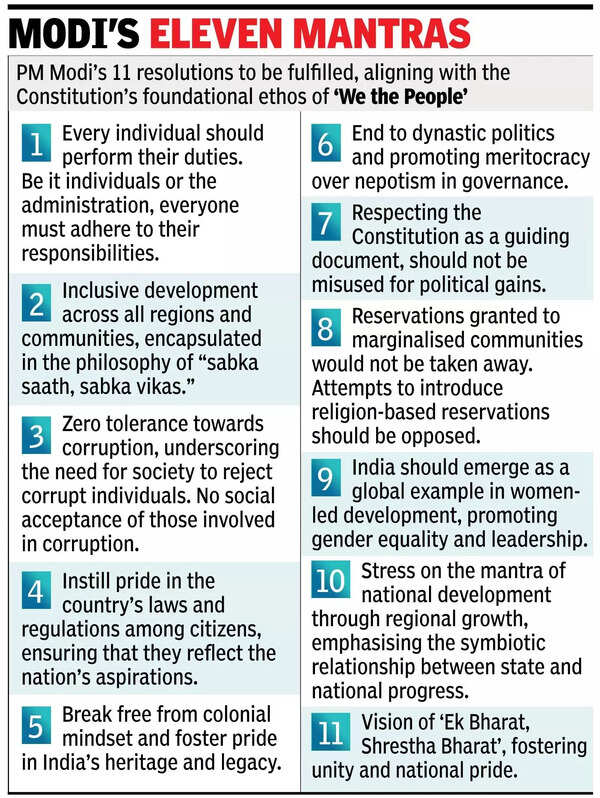NEW DELHI: PM Narendra Modi Saturday slammed the Nehru-Gandhi family, calling them habitual violators of the Constitution, as he said his government’s decisions in the past 10 years were aimed at boosting India’s strength and unity in line with the Constitution’s vision.
“There is one family which has caused maximum damage to the Constitution. They spared no effort to undermine it. It started with the first PM Pandit Nehru and has since been running in the family,” said Modi. “They developed a taste for blood and turned the Constitution into a prey…”

The attack came during his valedictory address to the two-day special session in Lok Sabha to mark the 75th anniversary of the promulgation of the Constitution. Modi used the occasion for a vigorous espousal of Uniform Civil Code, to highlight his decisions, and aggressively justify steps like Citizenship Amendment Act, and scrapping of Article 370.
Nehru amended statute even before first poll was held: PM
Modi turned the occasion into an opportunity to repulse the criticisms opposition had subjected him to through the LS campaign and afterwards. Some opposition MPs protested the PM’s remarks but had to endure the assault perhaps because, with the Constitution being the subject, the option of staging a walk out was not available.
In what was perhaps his first statement on CAA, the PM asserted that the law had been inspired by the concern of Mahatma Gandhi and other stalwarts for minorities in neighbouring countries. Modi also said that although Dr Ambedkar and other veterans, after intense deliberations, ruled out religion-based quota, Congress has tried to introduce it and has not given up even after being rebuffed by courts.
The Nehru-Gandhi family, however, bore the maximum brunt. Though it looked like a riposte to leader of opposition Rahul Gandhi‘s consistent attack on him for an alleged plot to scrap the caste quotas subverting the Constitution, Modi explained that he could not help mentioning the family which had been at the helm for 55 of the first 70 years since Independence. “I am focused on the Constitution and have not strayed from the subject,” said the PM repeatedly as he listed the amendments carried out by govts under Nehru, Indira Gandhi and Rajiv Gandhi.
“In fact, it started in 1951 when the first election had not even taken place. Nehruji was heading only an interim govt but that did not stop him from amending the Constitution through an ordinance to put curbs on freedom of press provided for by the stalwarts in the Constituent Assembly after due deliberation,” the PM said. Modi said Nehru was convinced the Constitution could not be a restraint on him and even put this across to chief ministers, saying, “Constitution cannot be allowed to be an impediment and should be cast aside if it comes in our way”.
He said that the extra-constitutional tendency remained entrenched in the succeeding generations of the family. Modi listed the amendments carried out by Indira Gandhi during Emergency and the law enacted by Rajiv Gandhi to nullify the Supreme Court verdict in the Shah Bano case. “This was a blow to attempt to do justice with a poor old lady and marked the capitulation to the hardliners because of vote bank considerations.”
Recalling Emergency as the darkest chapter in the country’s history, the PM said, “Democracy was suspended and thousands were thrown into jail. It was imposed because Indira Gandhi wanted to stay in power despite having been unseated as an MP by the court. It is a blot that Congress will never be able to erase.”
He gave the example of Rahul Gandhi tearing up the decision of the cabinet while also referring to former PM Manmohan Singh’s reported admission about the Congress chief being the centre of power. “It is sheer misfortune that Union Cabinet which is the supreme decision-making body accountable only to Parliament was forced to reverse itself because of an arrogant person,” the PM said recalling UPA’s dumping of the legislation it moved to protect convicted netas from being disqualified.
Modi said it is because of the Constitution that he, despite his humble background, got to serve thrice as PM and said the entire range of his policies – from healthcare for all, construction of toilets and provision of free gas connection to one nation-one ration, creation of public digital infrastructure and expansion of physical infrastructure across the country – were all moulded by the vision that underpins the Constitution.






